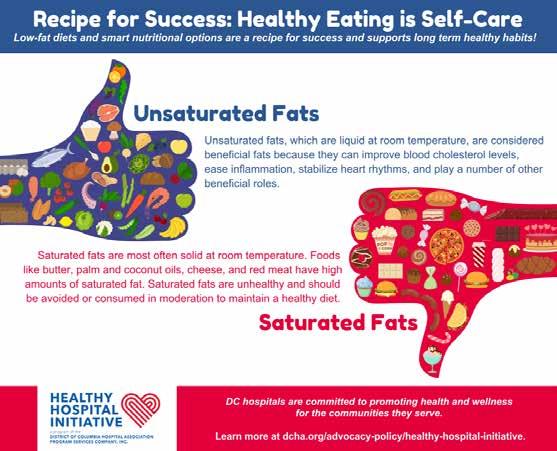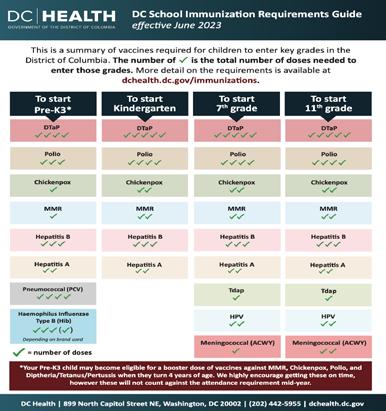
3 minute read
D.C. Health and OSSE Collaborate to Push Immunization Compliance
By Sam P.K. Collins WI Staff Writer
Per emergency legislation approved by the D.C. Council this summer, kindergarten through 12th Grade students are no longer required to take the COVID-19 vaccine to attend school in the District. However, District education and health officials continue to remind parents that their children must be up to date on mandatory immunizations against measles, typhoid and other diseases. They can do so during comprehensive preventative health visits.
From a child’s birth, these annual “well-child visits” help families, in part, ensure that their children are vaccinated according to DC Health’s immunization schedule.
“Well-child visits are vital [for parents] to identify and address any health concerns before they become more serious. These visits also provide an opportunity for parents to discuss any behavioral or developmental concerns with their child’s healthcare provider,” said Ayanna Bennett, acting director of DC Health.
“We understand that families have faced unprecedented challenges due to the COVID-19 pandemic,” Bennett continued. “However, it’s crucial that parents prioritize their children’s are margarine, fried foods, bacon, vegetable oil, pastries, and potato chips. health and schedule well child visits with their healthcare provider as soon as possible.”
Failure to comply with the immunization schedule could jeopardize a child’s enrollment into school this upcoming school year. Earlier this summer, DC Health and OSSE released a District-wide calendar for policy and exclusion, and revealed updates to D.C.’s school immunization policy.

Last school year, the District-wide K-12 immunization rate increased from 76% to 82.4% with 6,660 public and public charter school students coming into compliance. More than 50 public and public charter schools achieved at least a 90% immunization compliance rate within the same timeframe.
The Healthy Hospital Initiative and District of Columbia hospitals are committed to promoting healthy lifestyles. A balanced, low-fat diet that includes nutritious foods low in saturated fats is important because it helps reduce and manage cholesterol levels and lower cardiovascular risks.
By replacing the consump- tion of foods high in saturated fats with foods that have unsaturated fats, it helps keep the low-density Lipoprotein (LDL) cholesterol from rising, this in turn can lower the risk of heart disease and stroke. Some healthy fats include avocado, extra virgin olive oil, salmon, nuts and seeds, eggs, yogurt and dark chocolate, and some unhealthy fats to avoid
Along with carbohydrates and protein, fat is an important nutrient that plays an essential role in many aspects of human health. Knowing the types of fats helps us make the right decisions when it comes to eating and our diets.
Join DC hospitals and health professionals this summer to decrease your risk of cardiovascular disease by following our recipe for success, because healthy eating is part of selfcare and loving ourselves.
Learn more at dcha.org/advocacy-policy/healthy-hospital-initiative.
Those updates include the designation of two immunization points of contacts at each D.C. school, a simpler definition of noncompliance, and temporary exclusion. Students are considered noncompliant when they are due or overdue for at least one vaccine. Under temporary exclusion, students in Pre K-3, kindergarten and the 7th and 11th grades have until December to meet immunization requirements.
In their most recent call for parents to get their children immunized, Bennett and D.C. Mayor Muriel Bowser (D) announced a new portal through which medical providers can directly submit forms to D.C. Health and local schools. They also said that D.C. Health and its partners have also expanded vaccination access points to include school-based healthcare centers, District mobile medical units, and free pediatric immunization clinics.
State Superintendent Dr. Christina Grant said the updated policy, expanded vaccine access points and online portal, among other resources, will better enable families, schools and District agencies to collaborate around an important public health-related matter.
“We want to ensure that all of our students have everything they need for a healthy start to the school year, and this means making sure all children see their primary medical provider for a well-child visit and receive all needed immunizations,” Grant said.
“Our children belong in school with their friends and teachers who care about them, and we expect all children to be fully up-to-date on their routine pediatric vaccinations when they return to school this fall. Ensuring children have their routine immunizations helps them, their classmates and their school communities stay safe and healthy.”
@SamPKCollins









